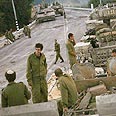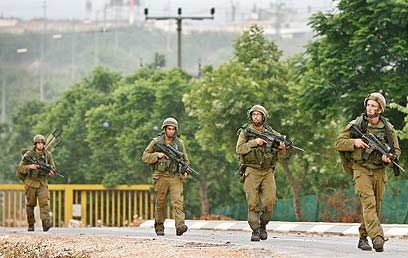
War aftermath: More IDF troops along border
Army expected to increase presence immediately following expected withdrawal from Lebanon; ‘we have no intention of setting up new outposts, but we certainly want to create a new situation in which the military activity is expanded,’ senior officer says
“While we have no intention of setting up new outposts, we certainly want to create a new situation in which the military activity is expanded – and to this end we need more soldiers,” a senior IDF officer told Ynet.
Meanwhile, UNIFIL has sent a number of its officers to the Northern Command headquarters and the Galilee Division as part of a new coordination mechanism with the IDF and to implement UN Resolution 1701.
The officers will be in close contact with IDF personnel regarding the situation in south Lebanon, but at this time there is no plan to open a direct channel of communication between the IDF and the Lebanese army.
IDF sources said they estimate that within the next two weeks or so the Israeli last troops will leave Lebanese territory and be replaced by Italian and French soldiers.
“This week a meeting is expected to take place between our representatives and UN officials, during the next phases of the withdrawal will be settled," one officer said. “IDF forces are still situated up to eight kilometers inside Lebanese territory. It seems that next week the forces will begin to move southward to the security fence, and a week later the forces will leave Lebanon.”

Number of troops manning border will be boosted (Photo: Reuters)
In any case, according to the officer, forces in the field were still searching for Hizbullah infrastructure and weapons and were finding such daily. Troops recently located a sophisticated bunker hewed into a mountain, about 400 meters northeast of the Israeli town of Rosh Hanikra.
“With that, calm is being maintained in all areas. We assess that Hizbullah operatives are wandering around in these areas, out of uniform and unarmed,” the officer said. “There were also reports that they dismantled their posts, and that is welcome news.”
The IDF is already looking ahead and discussions are being held on everything related to orders to open fire after the withdrawal from Lebanon. “We will take very aggressive steps if there is a case in which we identify armed Hizbullah agents in the area,” the officer said.
Redistribution of forces
Regarding the arrangement of forces along the border, GOC Northern Command Udi Adam told Ynet, “I am not going to concede even one soldier.” According to the plans being drafted, the arrangement of forces will be increased by over one-third compared to the deployment before the war. Most will be standing army soldiers. Forces will be stationed in already existing posts as well as in new posts along the entire border to optimally control security there.
“We are talking about infantry brigades, reinforced by tanks and gunners, with the intent to respond appropriately and immediately to any incident which could develop along the border in the future,” he said. According to the senior officer, during the fighting at least ten Hizbullah posts nest to the border were demolished, and now “all is flat.” After the new deployment of forces, the army plans to operate on a larger scale and exhibit its presence, while directly handling weak points.
The boosting of forces will obligate the IDF operations branch to redistribute the standing army, at the expense of Gaza and the West Bank.
Over the past few days international military forces have been arriving continuously in Lebanon, mainly by sea in coordination with the Israeli navy who has been maintaining a naval blockade since the war.
A senior naval officer told Ynet that the siege was aimed at applying significant pressure on Lebanon, “and the blockade might continue even after the infantry completes its withdrawal, depending on the decisions of the political ranks.”
'Delay shortening of service'
With that, a few days ago the IDF’s position was presented to Defense Minister Amir Peretz regarding shortening mandatory military service taking future missions into account.
The army requested to delay implementation of the plan to shorten service by three years, to 2010 rather than 2007.
In presenting their stance to Peretz, IDF head of Personnel Directorate Maj. General Elazar Stern and Deputy Chief of Staff Maj.-Gen. Moshe Kaplinsky explained that the new distribution of soldiers in the north and future missions in the south will require a solid number of soldiers.
The defense minister has not yet ruled on the issue.










